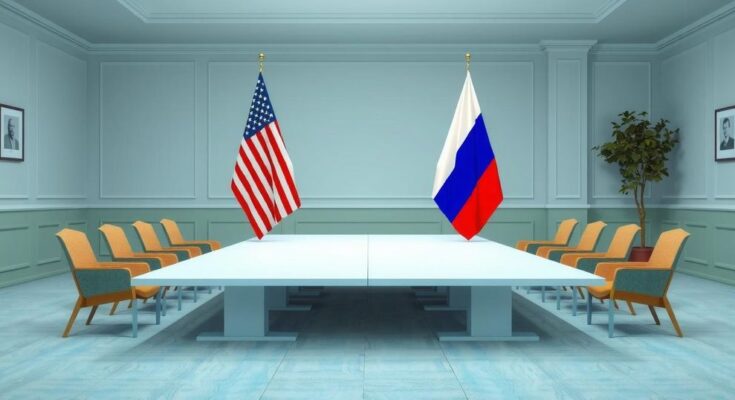U.S. and Russian negotiators are in talks to establish a partial ceasefire in Ukraine, with differing perspectives on protected targets. President Zelenskyy has reiterated the need for international pressure on Russia, while ongoing military actions complicate the situation. A cyberattack on Ukrainian railways and military operations continue to unfold amidst the diplomatic efforts.
U.S. negotiators are actively engaging in discussions with Russian representatives to establish a partial ceasefire in Ukraine. These talks follow separate discussions with Ukrainian officials, highlighting the ongoing tension between the parties regarding the terms of the ceasefire. Both countries have accused each other of undermining efforts to halt hostilities, complicating the negotiations.
A limited ceasefire agreement was reached in principle after a conversation between U.S. President Donald Trump and the leaders of both nations. However, there are differing interpretations of the agreement, particularly concerning which targets would be exempt from attacks. The U.S. administration has indicated that “energy and infrastructure” would be protected, while Russia has specified “energy infrastructure” only. Ukrainian President Volodymyr Zelenskyy has proposed additional protections for railways and ports.
The meetings in Saudi Arabia are expected to address these discrepancies and consider a temporary halt to attacks in the Black Sea to safeguard commercial shipping. U.S. and Russian representatives commenced discussions in Riyadh, where further meetings are anticipated, although no specific timeline has been established.
Kremlin spokesperson Dmitry Peskov reported that the Russian military is adhering to a directive from President Vladimir Putin to cease attacks on energy facilities for a duration of 30 days. Peskov has alleged that Ukraine interrupted the negotiation process by attacking a gas metering station, an accusation which the Ukrainian military has vehemently denied, asserting that the Russian military was responsible for the bombardment.
Simultaneously, although there have been reports of ongoing drone attacks by Russian forces targeting Ukraine, President Zelenskyy maintains that an unconditional ceasefire proposal has been available since March 11. During a recent televised statement, he underscored the importance of international pressure on Russia to cease its attacks, accusing it of continuing hostilities against Ukraine.
Zelenskyy has indicated openness to a comprehensive ceasefire, as proposed by Trump, but stated that Putin’s preconditions—cessation of arms supply to Ukraine and suspension of military mobilization—are unacceptable to Kyiv and its western allies. Steve Witkoff, Trump’s special envoy, expressed optimism regarding the talks in Saudi Arabia and suggested that a pause in the Black Sea region might lead to a full ceasefire on hostilities.
In related news, on the matter of peacekeeping forces, Chinese Foreign Ministry spokesperson Guo Jiakun has categorically denied any plans for China to deploy peacekeepers to Ukraine, emphasizing China’s consistent stance on the crisis and its lack of military involvement.
Lastly, Ukrainian state railway operator Ukrzaliznytsia experienced a significant cyberattack which temporarily affected its online booking system, though scheduled train operations remained unhindered. Additionally, Ukraine’s Special Operations Forces reported successful strikes against Russian military helicopters using American-supplied HIMARS rocket systems, showcasing ongoing military engagements amidst the evolving diplomatic efforts.
In conclusion, U.S. and Russian negotiators are currently engaged in critical discussions to establish a partial ceasefire in Ukraine amid accusations of sabotage from both sides. While a limited agreement has been reached, differences regarding specific protections, particularly concerning infrastructure, remain contentious. The situation continues to evolve, with international pressure playing a crucial role in influencing the negotiations. Furthermore, Ukraine faces additional challenges, including cyberattacks and ongoing military confrontations.
Original Source: time.com




